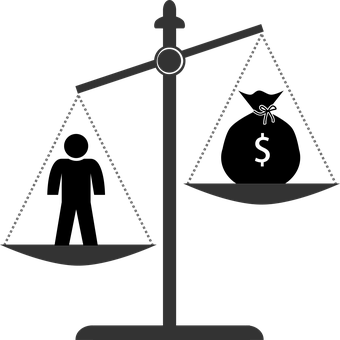What to Expect as a Poor Person in a Rich Man’s Game
What to Expect as a Poor Person in a Rich Man’s Game
You may have heard that “justice is blind,” which oddly enough was meant to suggest that justice is fair in America – it’s blind to class and race, and all the rest, supposedly. But if you’re being sued for debt you’ve probably heard of another saying that’s a little more apt: “it’s a big club, but you aren’t in it.”
But don’t give up. You have a good chance anyway.
I’m afraid that second saying is probably more relevant to what you can expect in the courts. If you’re going it pro se, that is to say representing yourself, you’re going to have some trouble getting the attention of most judges. They’re not going to value what you say as much as they’d value what a lawyer would say, especially a lawyer for a corporation. Most judges are on that side of the fence, and they’re DEFINITELY from that side of the tracks, if you know what I mean.
So let’s just say there’s an institutional bias – prejudice – against you. But I am saying “most” judges, after all, and some don’t share that bias.
And as a general rule judges do have a sense of fair play as far as playing by the rules, although again this is just a “general rule.” If they care about the outcome of a case, I’d say they can be pretty results driven, never minding the rules, but in fact most of them do NOT care about the outcome of debt cases. On the whole they seem not to like them, and we’ve all heard that debt collectors are notoriously heartless and… dirty. The judges are aware of all this, and I think they do regard them, on the whole, as the vultures of the legal kingdom. Judges often come from the more high profile sort of law.
But these are generalizations, and you should observe for yourself what your judge is like.
And here’s yet another general rule of the courts: the judges regard cases involving less than a couple of million dollars as being sort of trifling and not worth their time. That’s a thing you should never forget. It’s a question of who they blame for your case wasting their time. I think they start with the sense that YOU are to blame, if you bother defending yourself, but this can change, and we want it to change. You didn’t bring the suit, after all, but you are one of the few meaningfully opposing the debt collectors, and so the judges might blame you for that. It has often seemed that way to me, anyway.
This is all hardly a ringing endorsement of the process, I know, but probably nothing new to you, either. So why do I still think you have an excellent chance of winning if you fight these cases? Because the debt collectors really don’t usually have what they need to prove the things they need under the rules, and courts do have respect for rules. They’ll forgive corporate counsel a few transgressions, but in the final analysis they want the rules to be followed, and the case can be reversed on appeal if they don’t. So you have your chance.
And judges are people. The more time you spend with them, providing you keep your goals in mind and respect their time, the more the judges will like you, the more they’ll listen to what you have to say. And you will have the law on your side. That does matter. It usually makes all the difference if you know what you’re doing.
And that’s why we’re here – to make sure you do know what you’re doing. Just be aware that whatever they say about cutting a break for non-lawyers in the justice system – and they do in certain unimportant ways – you’re probably going to be held to a higher standard than the lawyer representing the debt collector rather than a lower one. You’re going to have to know more and do a better job than the other side.
You can do that, it just takes work and a certain humility. The lawyers on the other side are not the greatest legal minds. The debt collection business draws business people, and the business they’re in means they won’t spend a lot of time on your case. They won’t have a lot of the stuff they need or the time to get it. Your job is to figure that out in your case and show it to the judge in a way he or she will listen to. It’s a challenge, but it can usually be done. We’ll be helping you.
Debt Collection Lawyers
The lawyers for the other side have a job to do, and that’s to beat you. Some of them will treat you with respect, and others with contempt (which will be controlled), but remember their job, and however they present themselves to you it will be part of their overall plan to beat you. Don’t expect to go out with them for drinks after it’s all over.
If You’re Pro Se
If you’re trying to represent yourself, we can help. The best way for us to help is through membership, but we also have products that can help along the way.





